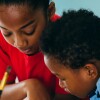Five Ways Early Educators Can Make Math Fun, According to an Early Education Researcher

Early childhood educators can get wary when it comes to teaching math to their young students. UC Irvine (UCI) Assistant Professor Andres Bustamante said teachers often question if the curriculum is too hard or whether the children will think it's boring and not like it.
Bustamante, who studies play-based learning in early childhood education, believes educators can make math memorable and enjoyable for children by integrating lessons into pastimes they like or are curious about. "Keeping math playful and embedded in activities that kids are already excited about keeps that love of learning going for them," he said.
As part of PBS SoCal's STEAM series, Bustamante offered tips on how to do that by exploring the intersection of math and play, since incorporating math and play together creates richer learning environments that promote other developmental skills. He also shared key approaches educators can use to teach math objectives, such as counting, making patterns and estimating, in their classrooms.
1. Promote Collaborative Activities
Teachers can make solving math problems a social experience where children can work and interact with their classmates. For example, they can have students build a tower and decide, as a group, how tall it should be, how many blocks they should use and how it should look.
"If you can give kids a problem that takes multiple kids to solve, they'll have to work together," Bustamante said. "There are not only math learning opportunities there, but they can also learn social-emotional skills like taking turns, listening and sharing."
2. Create Iterative Math Explorations
For Bustamante, "iterative" means the ability to try new things. "Each time you return to a learning situation, you can think of something new. You can answer a new question," he said. "It's not redundant or repetitive."
To make math iterative, Bustamante recommended introducing different learning goals for the same activities. Teachers can have students count building blocks one day and make patterns with the blocks in the following lesson. Another activity he suggested is allowing students to measure an object's width or length with standard and nonstandard units of measurement, such as rulers, handprints and strings.
3. Be Hands-On and Active
Instead of sitting children down and explaining to them how to solve math problems, teachers should let students do it themselves, Bustamante said because "People, in general, learn by doing, more than hearing or being told things."
He added that having engaging and hands-on math explorations will enhance the likelihood that children will remember key learning goals.
Additionally, he advised teachers to combine math with physical activity. Not only would this make math lessons fun for children, promote exercise and help build gross motor skills, but it will also aid in their learning, he said.
"Moving through space and being active helps kids learn more effectively because it's learning with multiple modalities," Bustamante explained, citing research that was done on using number lines to teach counting and magnitude to young children. By having students walk down number lines, they can visualize numbers and have a spatial representation.
4. Make Math Meaningful
Another approach to math that educators can use in their early learning classrooms is making the subject meaningful for children. According to Bustamante, educators can enrich their math curriculums by tapping into the students' interests, community and culture. "Kids have interests," he said. "Great teachers are the ones that can notice what kids are curious and excited about and build from that."
He said educators could also promote family engagement to make math relevant to student's daily lives. "Invite the parents to class or invite them to share stories about their culture and their history," he explained.
He also suggested having parents bake food from their culture for the class. They can then share recipes and measurements with the students. These activities will amplify cultural experiences, allowing children to feel represented, learn about their classmates and explore math in a different light.
5. Show How Fun Math Can Be
Bustamante said students could pick up on adults being nervous about math, which, in turn, makes them think it is a subject to be scared of. Educators should be a model for students and show how fun math is to prevent introducing anxieties to the class, he said.
"The most powerful thing you can do is show them all the rich math learning that's happening in all the activities they are already doing," he said, "like cooking or preparing snacks, there's measurements and talk of quantities."
Much of Bustamante's research focuses on embedding math and other STEM subjects with fun, play-based tasks in early learning settings. His studies include Parkopolis, a human-sized math and science board game. The activity features a shape zone where children can jump on color-coded shapes and a giant ruler so they can measure their strides.
He recommended educators take ideas from these designs and incorporate them into their classrooms. "Even without the big playground equipment and museum-type installations, you can still be creative and make a lot of these things out of much simpler materials," he said.
By adopting these approaches, teachers can cultivate exciting experiences where children can learn math and other skills organically.


